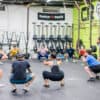Is Your Training Too Physical?
There are an infinite number of training methods and philosophies out there, all intended to make you stronger, improve your technique, and even rehabilitate your imbalances. All of these have one common theme- Physical Change.
It’s no secret that in order to get strong, you have to work hard- very hard. The weights are heavy; there are multiple sets, multiple reps, long training cycles, etc. So much emphasis is placed on these variables and everyone has a “secret method” that is better than the rest. But, what is largely overlooked is that no matter what physical adaptations you make, they will always take a back seat to HOW you make them.
It’s not WHAT you do, it’s HOW you do it!
It’s hard to imagine, but it is actually possible to give sub-maximal effort at close to maximal weights. On the contrary, it can be very difficult to give maximal effort at sub maximal weights. If you are unable to focus and carry out very specific intentions with each individual rep, you are missing out on what “training” actually is.
Training should be thought of as a preparation for your competition. Not only is it your intent to generally increase your strength and/or improve technique so that you can physically perform your best, but it should also be your intent to make each rep, set, and session have a specific impact on HOW you want to perform in competition.
Squats are just squats, unless you are USING the squats correctly- are you focusing on firing out of the bottom position the same way you do coming out of your cleans? Are you focusing on proper weight distribution so that you can control your hips and torso throughout the lift? Or, are you just squatting down and standing up and counting 1, 2, 3?
Because we train so frequently and with such a limited repertoire of exercises, it is very easy to become too concerned with performance outcomes at the expense of not actually being mentally engaged in the training.
So how do you bring more “intent” to your training? How can you have more carry-over from training to competition because of it?
Here are a few pointers to help focus your mental approach and intent in addition to physical outcomes.
Lose the headphones/Music
So often I see the let-down in competition. The lifter will be warming up completely disengaged from the competition- The music is blasting in their ears, thoughts are constantly focused around getting “hyped’ and staying “hyped.” For too long, the athlete is over-stimulated. Then… the headphones come out. It’s quiet. Very quiet. It’s boring. Very boring. Not enough external stimulation to keep the hype. Oh, by the way- it’s time for you to make your opening attempt.
Training without music allows for you to mentally engage yourself in your training the same way you engage yourself during competition. More specifically, engaging yourself at the MOST IMPORTANT time in competition.
This also gives you an opportunity to learn how to motivate yourself properly, without any external stimulation, and time the “hype” so that you can put it to use on the platform and not in your warm ups.
Lastly, athletes who choose to wear headphones during training are giving the coach the middle finger. It’s saying that “the environment you provide and the coaching you are giving me are not important.”
Train alone sometimes
To further emphasize learning how to stimulate mental game and engage in your training, do it alone! There’s no hype, there’s no one to validate you, and it’s just you and the barbell. Instead of having someone TELL you how you’re supposed to feel and lift, you can actually FEEL it for yourself! This will help you learn how to make adjustments from lift to lift and takes the pressure off of performing while others are around.
Experiment with new set-ups, techniques, etc. and expect to fail when doing it
Training alone is the perfect time to experiment with new things that you otherwise wouldn’t. Why? Because you are afraid to fail in front of people! Most people would rather continue doing things incorrectly than risk embarrassing themselves by failing while focusing on performing correctly. Take advantage of your alone time and improve the connection between you and the barbell.
Make connections between drills, hang variations, etc. to the actual lifts- don’t just do them to do them.
You don’t need drills to make adjustments- Drills and variations of lifts are to give you an opportunity to experience what a particular part of the lift is supposed to feel like when it’s performed correctly, without adding confusion by increasing complexity of the lift. Drills won’t “fix” your technique unless you are purposefully carrying these over into the full lifts.
If you aren’t making the connection between the drills and the lifts, then you are just getting better at the drill. Each drill has an intent- Focus on that specific component when performing the full lift and connect the dots between the drill and the movement.
Also, learn to make adjustments from rep to rep, even in the same set. If the lift didn’t feel right, make a conscious effort to do something different. Performing the lift the same way every time will give you the same outcome every time.
Warm up as if you were competing that day
It’s very easy to come into the gym, do the bare minimum to get loose, grab a barbell and start training. But, when you get to competition, you will spend countless minutes and hours preparing. Why are they different?
The warm up is influential on your performance. All physical preparations aside, the warm up is the time to reflect on the training program and develop intentions for each exercise. You should use this time to separate yourself from your life outside the gym, develop self-talk to funnel your focus to very specific tasks, and to mentally immerse yourself in the next 1-2 hours.
Put the Phone Down
This has 2 meanings to it. The first pertains to the distractions that it causes by allowing your outside life to bleed into your in training. You should treat the gym as a place you can separate yourself and funnel your energy into one thing for 1-2 hours.
The second pertains to performing for the camera. At times, constantly filming every rep you take can become a distraction to you AND to others. There are benefits to filming your lifts- to watch your technique and to log your training. Keep it to a minimum; keep the focus on the specific intent that you are lifting with- don’t just look for validation from others.
Train with intent! Every rep has a meaning, but it is up to you to hold yourself accountable and take your training beyond just physical adaptations.
What will you be working on today?
Phil Sabatini
M.S., C.S.C.S., USAW
Lecturer of Exercise Science
Old Dominion University
Human Movement Sciences
Phil is a former national champion and long time member of East Coast Gold Weightlifting. He is the Head Coach of the Barbell Syndicate at CrossFit Rife






